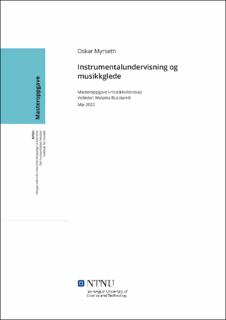| dc.contributor.advisor | Bucciarelli, Melania | |
| dc.contributor.author | Myrseth, Oskar | |
| dc.date.accessioned | 2022-10-05T17:19:21Z | |
| dc.date.available | 2022-10-05T17:19:21Z | |
| dc.date.issued | 2022 | |
| dc.identifier | no.ntnu:inspera:109865999:22977002 | |
| dc.identifier.uri | https://hdl.handle.net/11250/3024150 | |
| dc.description.abstract | Hvor mye rom er det for å vektlegge musikkglede i instrumentalundervisning? Før vi kan forsøke å svare på dette spørsmålet må vi utforske hva som ligger i begrepet musikkglede og hvordan dette kan relateres til pedagogiske aspekter. Det vi kaller musikkglede består av og påvirkes av et enormt antall forskjellige aspekter som identitet, mestring, motivasjon, flow, følelser, fellesskap, hormoner, smak, assosiasjoner og mer. Disse aspektene er heller ikke lett kvantifiserbare, noe som gjør diskusjonen vanskelig. Derfor vil jeg ikke forsøke å komme med noen endelige svar i denne avhandlingen, men jeg ønsker å sette lys på de sentrale utfordringene som er knyttet til tema og forsøke å legge fram fornuftige måter å tilnærme seg de på, noe jeg håper kan bidra til utvikling i feltet.
Ett tema som kommer til å være sentralt i oppgaven er til hvilken grad det å møte instrumentalelevene i deres egen musikkverden er forenelig med det å utvide deres musikalske horisonter. Jeg kommer til å argumentere at å utvide elevenes musikalske horisonter og å bidra til et aktivt forhold til musikk hos eleven er et sentralt mål i musikkundervisning, samtidig som at det er viktig å møte dem i deres egen musikkverden om vi skal ha best kjangs på å opprettholde motivasjon, mestring og musikkglede hos eleven, og at foreningen av disse to tilnærmingene derfor er avgjørende. Jeg vil også gå mye dypere inn på hva som faktisk ligger i det å møte elevene i deres egen musikkverden og å utvide musikalske horisonter.
For å innskrenke fokuset mitt vil jeg ta utgangspunkt i instrumentalundervisning på norsk videregående skole når jeg utforsker disse spørsmålene. I denne sammenheng dukker det også opp et nytt og viktig aspekt av problemstillingen; nemlig idealer versus institusjonelle utfordringer. Lærere på videregående skoler er nødt til å forholde seg til retningslinjer fra myndighetene, nasjonale undervisningsplaner og andre logistiske utfordringer, noe som kan gjøre det vanskelig å følge etter idealene. Dette aspektet vil bli adressert i kapittel 4 og 5, men er viktig å ha i bakhodet gjennom hele lesningen. Jeg vil diskutere problemstillingen gjennom hovedsakelig fire linser; musikkpedagogikk, kulturelle perspektiver, filosofiske perspektiver og sosialpsykologiske perspektiver, og har delt inn kapitlene deretter. | |
| dc.description.abstract | How much room is there for emphasizing the joy of music in instrumental tuition? Before we can attempt to answer this question we have to explore what constitutes the joy of music and how it can be related to pedagogical aspects. What we refer to as the joy of music consists of and is affected by a large number of different aspects such as identity, mastery, motivation, flow, emotions, community, hormones, taste, associations, and more. What further complicates the discussion is the fact that these questions are not at all easily quantifiable. Therefore, I will not attempt to present any final answers in this thesis. Rather, I wish to shed light on some of the central challenges of the subject matter and attempt to formulate sensible ways of approaching them, which I hope will contribute to positive development in the field.
One theme that will be central in the thesis is to which degree meeting the students in their own musical world is compatible with expanding their musical horizons. I will argue that expanding the students’ musical horizons and fostering an active engagement with music is an important goal in music education, while asserting that meeting them in their own musical world is integral if we should hope to maintain their motivation, feeling of mastery, and joy of music, and that balancing these two is essential. I will also dive much deeper into what constitutes meeting the students in their own musical world and expanding musical horizons.
To narrow my scope I will base the discussion around instrumental tuition at the music program in Norwegian upper secondary school, or “musikklinja”, when I explore these questions. In this context, another important aspect of the research question shows itself; the problem of ideals vs. institutional challenges. Teachers at upper secondary schools are bound to national guidelines, curriculum, and other logistical challenges, which can make it difficult to stick to any ideals individual teachers might have. This aspect will be addressed directly in chapters four and five but is important to keep in mind through the entire read. I will discuss the research question mainly through these four lenses; musical pedagogy, cultural perspectives, philosophical perspectives, and social-psychological perspectives, and the chapters are divided as such. | |
| dc.language | nob | |
| dc.publisher | NTNU | |
| dc.title | Instrumentalundervisning og musikkglede | |
| dc.type | Master thesis | |
